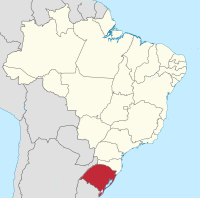
Photo from wikipedia
Despite the considerable morbidity and mortality of arboviral infections in Brazil, such as Zika, chikungunya, dengue fever, and yellow fever, our understanding of these outbreaks is hampered by the limited… Click to show full abstract
Despite the considerable morbidity and mortality of arboviral infections in Brazil, such as Zika, chikungunya, dengue fever, and yellow fever, our understanding of these outbreaks is hampered by the limited availability of genomic data to track and control the epidemic. In this study, we provide a retrospective reconstruction of the Zika virus transmission dynamics in the state of Goiás by analyzing genomic data from areas in Midwest Brazil not covered by other previous studies. ABSTRACT Since the introduction of the Zika virus (ZIKV) into Brazil in 2015, its transmission dynamics have been intensively studied in many parts of the country, although much is still unknown about its circulation in the midwestern states. Here, using nanopore technology, we obtained 23 novel partial and near-complete ZIKV genomes from the state of Goiás, located in the Midwest of Brazil. Genomic, phylogenetic, and epidemiological approaches were used to retrospectively explore the spatiotemporal evolution of the ZIKV-Asian genotype in this region. As a likely consequence of a gradual accumulation of herd immunity, epidemiological data revealed a decline in the number of reported cases over 2018 to 2021. Phylogenetic reconstructions revealed that multiple independent introductions of the Asian lineage have occurred in Goiás over time and revealed a complex transmission dynamic between epidemic seasons. Together, our results highlight the utility of genomic, epidemiological, and evolutionary methods to understand mosquito-borne epidemics. IMPORTANCE Despite the considerable morbidity and mortality of arboviral infections in Brazil, such as Zika, chikungunya, dengue fever, and yellow fever, our understanding of these outbreaks is hampered by the limited availability of genomic data to track and control the epidemic. In this study, we provide a retrospective reconstruction of the Zika virus transmission dynamics in the state of Goiás by analyzing genomic data from areas in Midwest Brazil not covered by other previous studies. Our study provides an understanding of how ZIKV initiates transmission in this region and reveals a complex transmission dynamic between epidemic seasons. Together, our results highlight the utility of genomic, epidemiological, and evolutionary methods to understand mosquito-borne epidemics, revealing how this toolkit can be used to help policymakers prioritize areas to be targeted, especially in the context of finite public health resources.
Journal Title: Microbiology Spectrum
Year Published: 2022
Link to full text (if available)
Share on Social Media: Sign Up to like & get
recommendations!